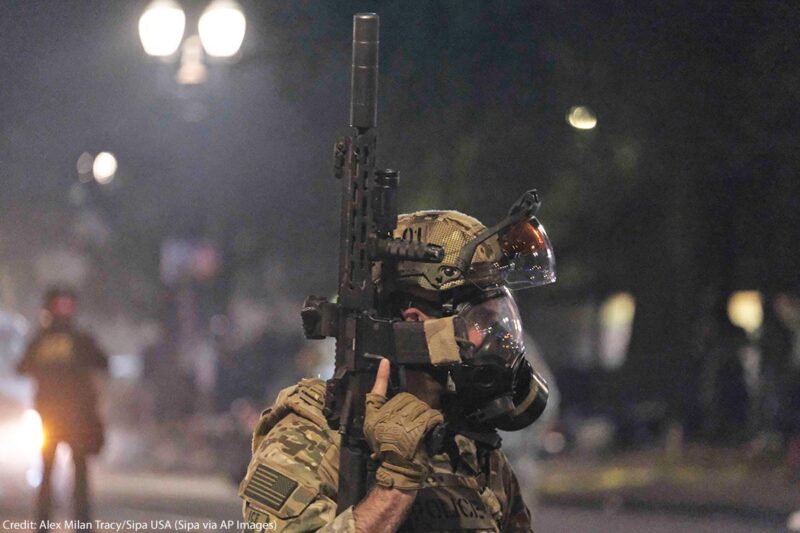New Law Requires Federal Agents to Identify Themselves to Protesters


When people took to the streets this year to protest racial injustice and police brutality against Black people, they faced a repressive, violent response from local police and federal agents. Some of these agents arrived with militarized uniforms, riot gear, and weapons, but, notably, no visible name labels, badges, or even insignia marking their government agency. Congress just put a stop to this corrosive and undemocratic secrecy, requiring federal agents to identify themselves.
Tucked inside the National Defense Authorization Act (), which just became law, is a new requirement for federal military and civilian law enforcement personnel involved in the federal government's response to a "civil disturbance" to wear visible identification of themselves and the name of the government entity employing them. That's good news, because requiring such identification should be a no-brainer in a democracy. When government employees are interacting with members of the public and exercising government authority, such as the power to arrest people, the public should have the right to know who the employees are and which agency employs them.
Furthermore, when government personnel engage in wrongdoing, such as attacking protesters, one of the first steps in holding them accountable is knowing who they are. It's no surprise that rights-violating law enforcement would want to obscure their name plate and badge number before committing some unethical or even illegal act. Impeding transparency blocks oversight and accountability.
What the nation witnessed in Washington, D.C. and Portland, Oregon underscores the vital need for the legislation. In , incognito federal officers who refused to identify themselves snatched civilians off the street and whisked them away in unmarked vehicles. Only later did U.S. Customs and Border Protection and the U.S. Marshals Service reveal that they were involved. In our , the Trump administration swarmed the city with heavily-armed, unidentified officers with unclear governmental affiliations. When asked by journalists to give their names or specific governmental affiliation, these federal officers .
The resulting images provoked outcries of our government resorting to the kinds of unaccountable "secret police" used by authoritarian regimes to silence dissidents and terrify ordinary citizens into submission. Protesters and security experts also that the unidentified government forces' appearances can be practically indistinguishable from the kinds of right-wing armed extremists that have, among other things, shot racial justice protesters on the streets of Kenosha, plotted to kidnap Michigan’s governor, and engaged in violent clashes around the country. This creates the risk that members of the public will treat law enforcement agents as illegitimate armed vigilantes, or defer to vigilantes who are posing as law enforcement.Â
In an important step forward for government transparency and accountability, lawmakers like and heeded the calls for reform and sought to ensure that a new identification requirement would be part of the final defense bill. Thankfully, they were successful.
Even with this provision poised for enactment, additional reform is still urgently needed at all levels of government. For example, it is always better to have the officer's name displayed rather than allowing a non-name identifier, such as a badge number, to be used as a substitute. Names are usually easier to remember than numbers or letters, thus making it easier for people to later identify and report officers. The current exceptions to the new identification requirement should also be narrowed.
Still, the message that Congress is sending to the executive branch and enshrining into statute is unmistakable: Secret police forces patrolling our neighborhoods in response to protests and other mass gatherings, in anonymity and shielded from accountability, are unacceptable. They do not belong in a democracy such as the United States.Â
When the next president takes office this month, his administration should affirm the principle as it implements the new law in the strongest possible manner — and keep its goal of a transparent and accountable government in mind as it works with Congress and civil society to respond to the inequities highlighted by the recent protests.Â


